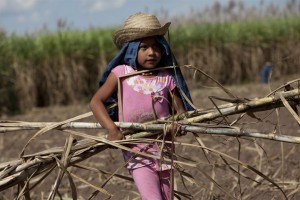A new law in Bolivia is causing a stir as the country is the first in the world to legalize work by 10-year olds. The justification offered by officials was simply “kids want to work.” In investigating child labor in the U.S., Human Right Watch found that kids, 12 years-old and younger were working for tobacco farmers, such as Paul Hornback, a Kentucky senator. While appearing on the Daily Show, Hornback stated “When I was a 7-year old, I was wanting to work.”
This justification that young children want to work has been mirrored by other countries internationally. Mali and Tanzania made the same argument relating to the work of children in gold mines; El Salvador made it for the harvesting of sugarcanes by children; while Morocco used the argument for its child domestic workers.
Bolivia’s new law came about in part, due to the pressure from a union of child workers arguing that they need to work to support their families. While these children might have voiced a need to work to support their families, it seems there is a deeper problem lingering beneath the surface. The problem is that many families are struggling to meet ends meet. This is not just a problem occurring in Bolivia but even in the U.S.A , a twelve-year old boy in North Carolina stated he wanted to start working on a tobacco farm because he “needed” the money. Many of the children interviewed for the Human Rights Watch tobacco farming report stated they started working to earn money for their basic needs such as family bills, clothes, and school supplies. These children start working at such a young age because their families are living in extreme poverty and their parents are not able to make ends meet with their minimum wage jobs. Why should children need to work to support their families? Children as young as 10 should not bear such a burden of having to support their family economically, let alone to pay for school supplies.
Children should not be penalized by the poverty accruing in their communities either in the U.S. or internationally. By allowing children to legally work at such a young age, they are jeopardizing their education, which is limiting their opportunities to get high paying jobs later on. Studies report that children who enter the workforce at an early age typically end up with less education and lower earnings, thus having to send their children to work. Child labor is only a “short-term” solution because it is only perpetuating more child labor.
Child labor is also hazardous to a child’s health and development. Children working in gold mines and tobacco farms abroad are exposing themselves to toxic chemicals. Nearly all children interviewed by the Human Rights Watch around the world stated they would rather be in school than working.
The International Labor Organization stated that 14 is the earliest age children should be working. In developing countries the lowest age for children to start working is 15. Bolivia should not be sending the message to parents and other nations that letting children work at 10 is acceptable. These children should be in school and enjoying their youth.
Bolivia as well as other governments should be enacting laws to protect children from child labor, not endorsing it.
Do you agree with Bolivia’s new law allowing children to start working at 10? Do you think these children really want to work or is this just a poor excuse by governments, to create a short-term solution?
Source: Human Rights Watch, ‘Kids Want to Work’ is a Poor Justification for laws that legalize work by 10-year-olds

I find it very hard to believe that these children “want” to work. No one really “wants” to work. People work out of necessity to provide for themselves and their families. Children as young as ten years old should not be encouraged to have to give up their childhood by working. They should be attending school, playing with friends, and developing themselves to become healthy, smart individuals. Bolivia may have an interest in letting these children work because they provide cheap labor.
Instead, Bolivia’s government should be making a long-term investment. They should be investing in their children’s education so they have a higher percentage educated citizens with specialized skills that can attract foreign direct investment that can be meaningful and boost the economy.
Since this is easier said than done, I think they should at least start with a minimum work week such as 10-15 hours to allow these children to go to school. Also, they should also be prohibited from working in hazardous occupations such as mining.